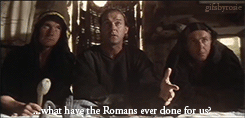Just a little over a year ago, I asked Santa to bring me some books on historical bastards. This was one of the treats that Santa (or rather, NikNak) responded with.
Rasputin - looks like a creepy bastard, right?
Prior to reading this, the only thing I really knew about Rasputin was that he was apparently Russia’s greatest love machine (thanks, Boney M). I now know that he was actually just Russia’s most persistent lech, but I also learnt a lot more (including the surprising revelation that this all happened so recently. Thanks to the ready acceptance of mystical bullshit on the part of the Royals, I’d thought this all took place in like, olden times.)
Born a peasant in a Russia that very much gave a shit about that sort of thing, Rasputin spent most of his youth apparently being drunk and violent, before a sudden change of heart led him to travel the country visiting holy places and like, finding himself, man. Instead of just getting a bit religious, he’d go the whole hog and soon make a name for himself through his ‘prophetic visions’ and performing of ‘miracles’. Which would bring him to the attention of a Royal Family already prone to religious gullibility and worried for the health of their young son and haemophiliac heir.
Having already been hypnotised by another chancer into thinking she was pregnant (who explained, come her humiliation come her time of confinement and realisation that she was as pregnant as I am, that the pregnancy had disappeared due to her lack of faith), the tsarina was soon eating out of Rasputin’s hand (not literally), claiming his enemies as her own and alienating everyone else around her. As the Royal Family became increasingly isolated by the rest of their own family, the court, the church and the government, Rasputin would be dogged by controversy. Especially once he reverted back to drinking.
Rasputin during an early rehearsal for John Lennon's Bed-In
(not really, he's recovering from an unsuccessful assassination attempt)
(not really, he's recovering from an unsuccessful assassination attempt)
Already prone to groping anyone he could get his hands on and visiting, sometimes in just one day, many, many prostitutes (apparently he could totally cleanse you of sin by having sex with you), he was also believed to be controlling the tsarina (although the tutor to the royal children had it right when they said, 'His prophetic words most often merely confirmed the hidden wishes of the empress herself. She herself did not suspect that she had induced them, that she was their 'inspirer'. Her personal wishes, passing through Rasputin, acquired in her eyes the force and authenticity of revelation.') But the belief of his influence, alongside his penchant for bragging about his connections and power whilst slaughtered, would apparently wind up the wrong people and he would eventually be murdered by two members of the Royal Family and a leading politician – a murder that would help build his legend, no doubt thanks to Prince Felix’s dramatic description of the murder which read like something out of a zombie novel (“…With an abrupt, furious movement, Rasputin sprang to his feet. He was foaming at the mouth. He was horrifying. The room resounded with a savage roar, and I saw the flash of his convulsively clenched fingers. Then, like red-hot iron, they sank into my shoulder and reached for my neck…”).
A big, thick book that I ripped through in a matter of days, I couldn’t put this down thanks to the incredible details of Rasputin’s life. Making a legend much more human (even if he was a very, um, complicated man), this was packed with astonishing, sometimes awful and sometimes hilarious facts (I don’t know why I find this so funny, but on being challenged on why he kept taking young ladies to bathhouses, he replied, 'The society misses were so puffed up with pride, and in order to deflate it, it was necessary to humiliate them by forcing them to go to the bathhouse with a dirty peasant.').
I could have filled this review with a million of my favourite excerpts, but you really ought to read them for yourself. Go on.


















































